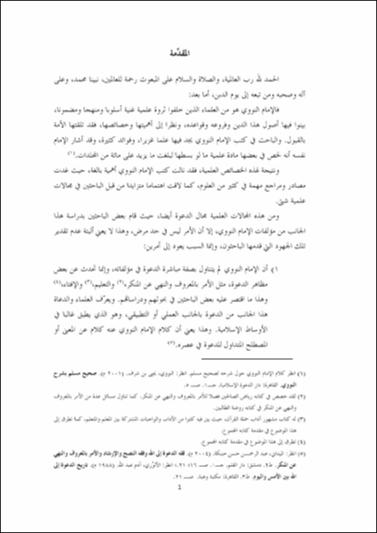| dc.description.abstract | This research examines the concept of Usus Al-Dakwah from the viewpoint of Al- Imam Al-Nawawi as it is expressed in his books. Since the Al-Dakwah appears in its new scientific methodology, it is necessary for the research to highlight aspects of the field of the Al-Dakwah and provide the answers to the following research questions: What are the principles and foundations of Al-Dakwah with regard to the dài (person who calls to the Islam), to the maduvv (person who is called to the Islam), to Al-Dakwah topics and to the Al-Dakwah tools? This research is of great importance, not only to document the views of Al-Imam Al-Nawawi historically, but also to document his fiqh (understanding) of Al-Dakwah in the arena of contemporary advocacy. The research aims to explore the principles and the foundations of Al-Dakwah as presented by Al-Imam Al-Nawawi and the way how to apply them in modern methods of communication. In order to highlight these aspects, in the research we have used several research methodologies. The first
one is the historical method. We use this method in our research to know more about Al-Imam Al-Nawawi’s time and its influence on him. The second method is the descriptive method, which we use for the description of Al-Imam Al-Nawawis thoughts and ideas. And the third one is the analytical and deductive method, which we use in our research to analyze annotations from which we draw advocacy lessons and find the best way to apply these foundations in modern communication methods and tools. The research found the following essential results: The meaning of Al-Dakwah in Al-Imam Al-Nawawi’s time had these
connotations: al-nasihah (admonition), al-amr bil-ma’ruf va al-nahy an almunker (ordering for acknowledged virtues and forbidding from sin), and alta’lim (education); the research proves the good treatment to be a very important way and method to call people to the way of Allah Subhanahu wa taala; the research also substantiates the possibility of applying principles of Al-Dakwah in the modern communication methods and tools. Finally, the research recommends that academicians at Islamic Universities should focus on referring to the first forerunners among the Muslim Scholars, to embrace their thoughts and opinions and apply them in large area of researches and graduate academic exercises. It
also recommends that the community, governments and institutions should organize and supervise advocacy work, as well as train and prepare preachers to be fully qualified. Due to the challenges of the modern time, it is recommended to use these modern ways and abilities to call people to the way of Allah Subhanahu wa taala. | en_US |


